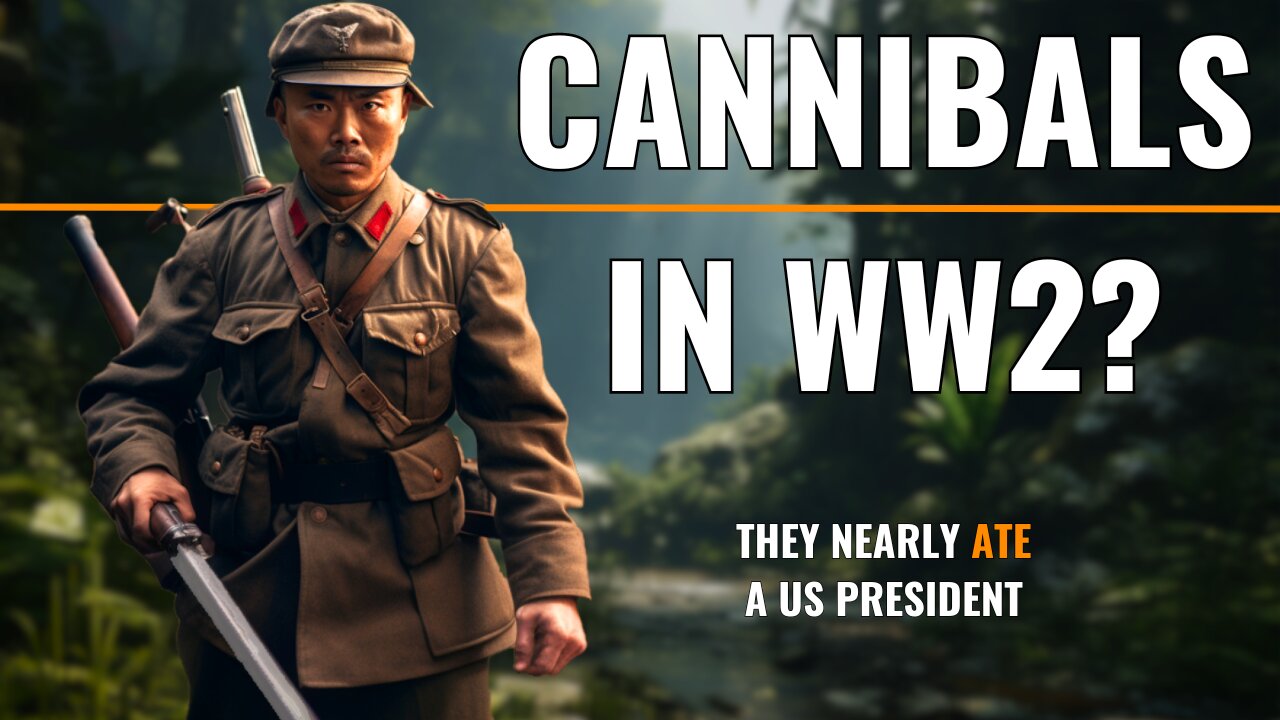Premium Only Content

Unknown Horrors of the Imperial Japanese Army During WW2
(An edited version for all audiences)
Ever heard of soldiers munching on other soldiers? Yeah, that happened.
________
To truly grasp the intensity of these horrors, we must first understand the ethos that drove many Japanese soldiers: Bushidō, a Japanese equivalent of a knight’s chivalric code.
It was as intense as it sounds. But it was also about a lot more than just swinging a katana and wearing armor.
Originating in the Edo period, which spanned from 1603 to 1868, Bushidō was a way of life, deeply ingrained in the samurai culture.
And while it might be tempting to draw parallels with European chivalry, let's not get too hasty. Sure, there were similarities, like a focus on honor and loyalty… to a degree.
But Bushidō had its own unique flavor, a blend of Confucianism, Shinto, and Zen Buddhism, giving it a depth and complexity that was distinctly Japanese, emphasizing values like sincerity, frugality, and loyalty above all else.
Loyalty especially, was paramount, even if not all samurai adhered to this principle… let alone all IJA members.
The pursuit of excellence in martial arts? That was expected of course. But it wasn't just about physical prowess. It was about the mind, strategy, discipline, and honor.
Honor until death. In fact, the concept of "seppuku" or ritual suicide was a testament to this. If a samurai felt they had lost their honor, they'd rather end their life than live in disgrace, ritualistically stabbing themselves in the stomach with the aim of disembowelment.
Ever heard of soldiers munching on other soldiers? Yeah, that happened.
________
To truly grasp the intensity of these horrors, we must first understand the ethos that drove many Japanese soldiers: Bushidō, a Japanese equivalent of a knight’s chivalric code.
It was as intense as it sounds. But it was also about a lot more than just swinging a katana and wearing armor.
Originating in the Edo period, which spanned from 1603 to 1868, Bushidō was a way of life, deeply ingrained in the samurai culture.
And while it might be tempting to draw parallels with European chivalry, let's not get too hasty. Sure, there were similarities, like a focus on honor and loyalty… to a degree.
But Bushidō had its own unique flavor, a blend of Confucianism, Shinto, and Zen Buddhism, giving it a depth and complexity that was distinctly Japanese, emphasizing values like sincerity, frugality, and loyalty above all else.
Loyalty especially, was paramount, even if not all samurai adhered to this principle… let alone all IJA members.
The pursuit of excellence in martial arts? That was expected of course. But it wasn't just about physical prowess. It was about the mind, strategy, discipline, and honor.
Honor until death. In fact, the concept of "seppuku" or ritual suicide was a testament to this. If a samurai felt they had lost their honor, they'd rather end their life than live in disgrace, ritualistically stabbing themselves in the stomach with the aim of disembowelment.
Ever heard of soldiers munching on other soldiers? Yeah, that happened.
________
To truly grasp the intensity of these horrors, we must first understand the ethos that drove many Japanese soldiers: Bushidō, a Japanese equivalent of a knight’s chivalric code.
It was as intense as it sounds. But it was also about a lot more than just swinging a katana and wearing armor.
Originating in the Edo period, which spanned from 1603 to 1868, Bushidō was a way of life, deeply ingrained in the samurai culture.
And while it might be tempting to draw parallels with European chivalry, let's not get too hasty. Sure, there were similarities, like a focus on honor and loyalty… to a degree.
But Bushidō had its own unique flavor, a blend of Confucianism, Shinto, and Zen Buddhism, giving it a depth and complexity that was distinctly Japanese, emphasizing values like sincerity, frugality, and loyalty above all else.
Loyalty especially, was paramount, even if not all samurai adhered to this principle… let alone all IJA members.
The pursuit of excellence in martial arts? That was expected of course. But it wasn't just about physical prowess. It was about the mind, strategy, discipline, and honor.
Honor until death. In fact, the concept of "seppuku" or ritual suicide was a testament to this. If a samurai felt they had lost their honor, they'd rather end their life than live in disgrace, ritualistically stabbing themselves in the stomach with the aim of disembowelment.
-
 LIVE
LIVE
The Quartering
3 hours agoFat Soldiers BLASTED, Kirk Assassin In Court, JK Rowling Destroys Emma Watson & Crowder Takes Risk
15,149 watching -
 1:17:12
1:17:12
Winston Marshall
1 hour agoExposing The EU’s Plot To Destroy Free Speech in America | Mike Benz
2.21K9 -
 LIVE
LIVE
Sean Unpaved
2 hours agoMNF Mayhem: Doubleheader Drama, Cheetah's Crushing Fall, & MLB's October Ignition
458 watching -
 LIVE
LIVE
Russell Brand
2 hours agoGavin de Becker | Fear, Freedom & Resisting Control - SF642
1,821 watching -
 10:34
10:34
Clownfish TV
3 hours agoGetting 'Canceled by Trump' is GREAT for Ratings?! | Clownfish TV
6884 -
 14:42
14:42
Professor Gerdes Explains 🇺🇦
2 hours agoThis ONE SENTENCE from Putin Guarantees a Long War
-
 19:05
19:05
Sponsored By Jesus Podcast
2 days agoI Lost the World But Gained My SOUL | Freedom in Christian Suffering
1.14K3 -
 14:47
14:47
Dr. Nick Zyrowski
15 days agoFasting Is THE Cure - NO FOOD FOR 3 DAYS Completely Heals You!
1.35K9 -
 LIVE
LIVE
ROSE UNPLUGGED
44 minutes agoClimate Fatigue: Is the Whole World Feeling It?
44 watching -
 2:01:24
2:01:24
The Charlie Kirk Show
2 hours agoBiblical Borders + The Illegal Superintendent + Shutdown Fever | Deace, Homan | 9.30.2025
148K39